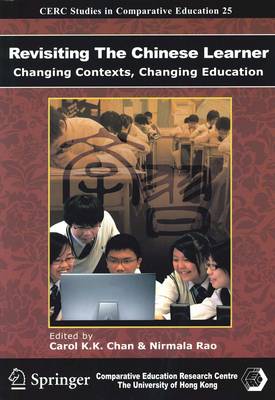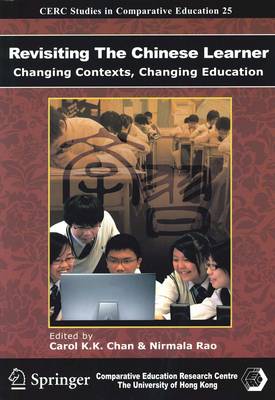
Door een staking bij bpost kan je online bestelling op dit moment iets langer onderweg zijn dan voorzien. Dringend iets nodig? Onze winkels ontvangen jou met open armen!
- Afhalen na 1 uur in een winkel met voorraad
- Gratis thuislevering in België vanaf € 30
- Ruim aanbod met 7 miljoen producten
Door een staking bij bpost kan je online bestelling op dit moment iets langer onderweg zijn dan voorzien. Dringend iets nodig? Onze winkels ontvangen jou met open armen!
- Afhalen na 1 uur in een winkel met voorraad
- Gratis thuislevering in België vanaf € 30
- Ruim aanbod met 7 miljoen producten
Zoeken
Revisiting the Chinese Learner
Changing Contexts, Changing Education
Carol K. K. Chan, Nirmala Rao
Paperback | Engels
€ 38,95
+ 77 punten
Omschrijving
This book, which extends pioneering work on Chinese learners in two previous volumes, examines teaching and learning in Chinese societies and advances understanding of 'the Chinese learner' in changing global contexts. Given the burgeoning research in this area, pedagogical shifts from knowledge transmission to knowledge construction to knowledge creation, wide-ranging social, economic and technological advances, and changes in educational policy, Revisiting the Chinese Learner is a timely endeavor. The book revisits the paradox of the Chinese learner against the background of these educational changes; considers how Chinese cultural beliefs and contemporary change influence learning; and examines how Chinese teachers and learners respond to new educational goals, interweaving new and old beliefs and practices. Contributors focus on both continuity and change in analyzing student learning, pedagogical practice, teacher learning and professional development in Chinese societies. Key emerging themes emphasize transcending dichotomies and transforming pedagogy in understanding and teaching Chinese learners. The book has implications for theories of learning, development and educational innovation and will therefore be of interest to scholars and educators around the world who are changing education in their changing contexts.
Specificaties
Betrokkenen
- Auteur(s):
- Uitgeverij:
Inhoud
- Aantal bladzijden:
- 376
- Taal:
- Engels
Eigenschappen
- Productcode (EAN):
- 9789628093168
- Verschijningsdatum:
- 1/07/2009
- Uitvoering:
- Paperback
- Formaat:
- Trade paperback (VS)
- Afmetingen:
- 165 mm x 241 mm
- Gewicht:
- 609 g

Alleen bij Standaard Boekhandel
+ 77 punten op je klantenkaart van Standaard Boekhandel
Beoordelingen
We publiceren alleen reviews die voldoen aan de voorwaarden voor reviews. Bekijk onze voorwaarden voor reviews.











